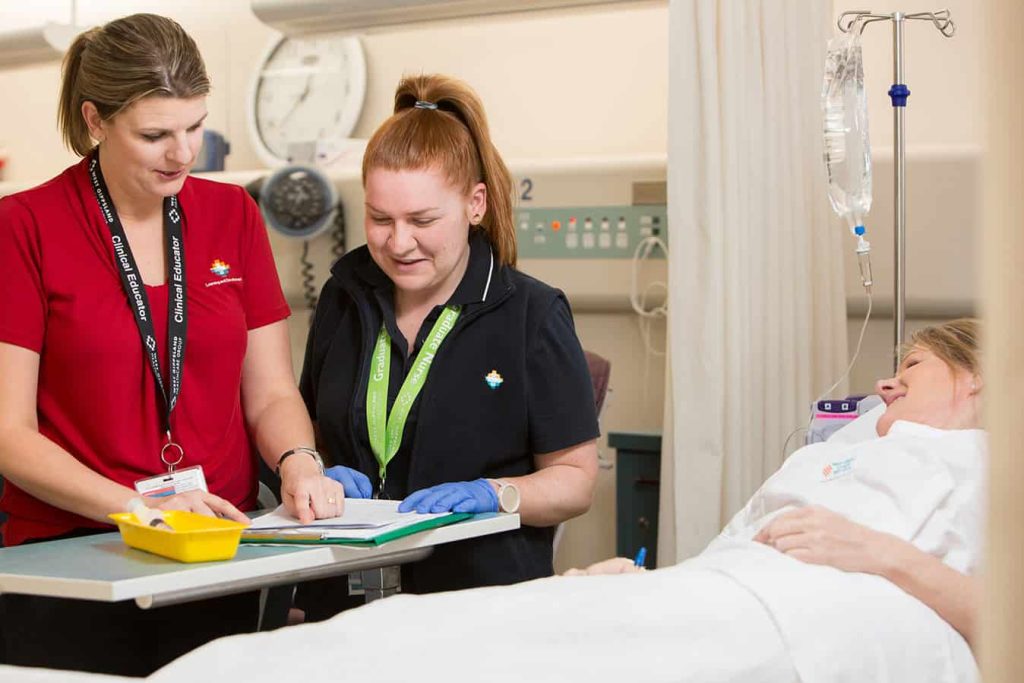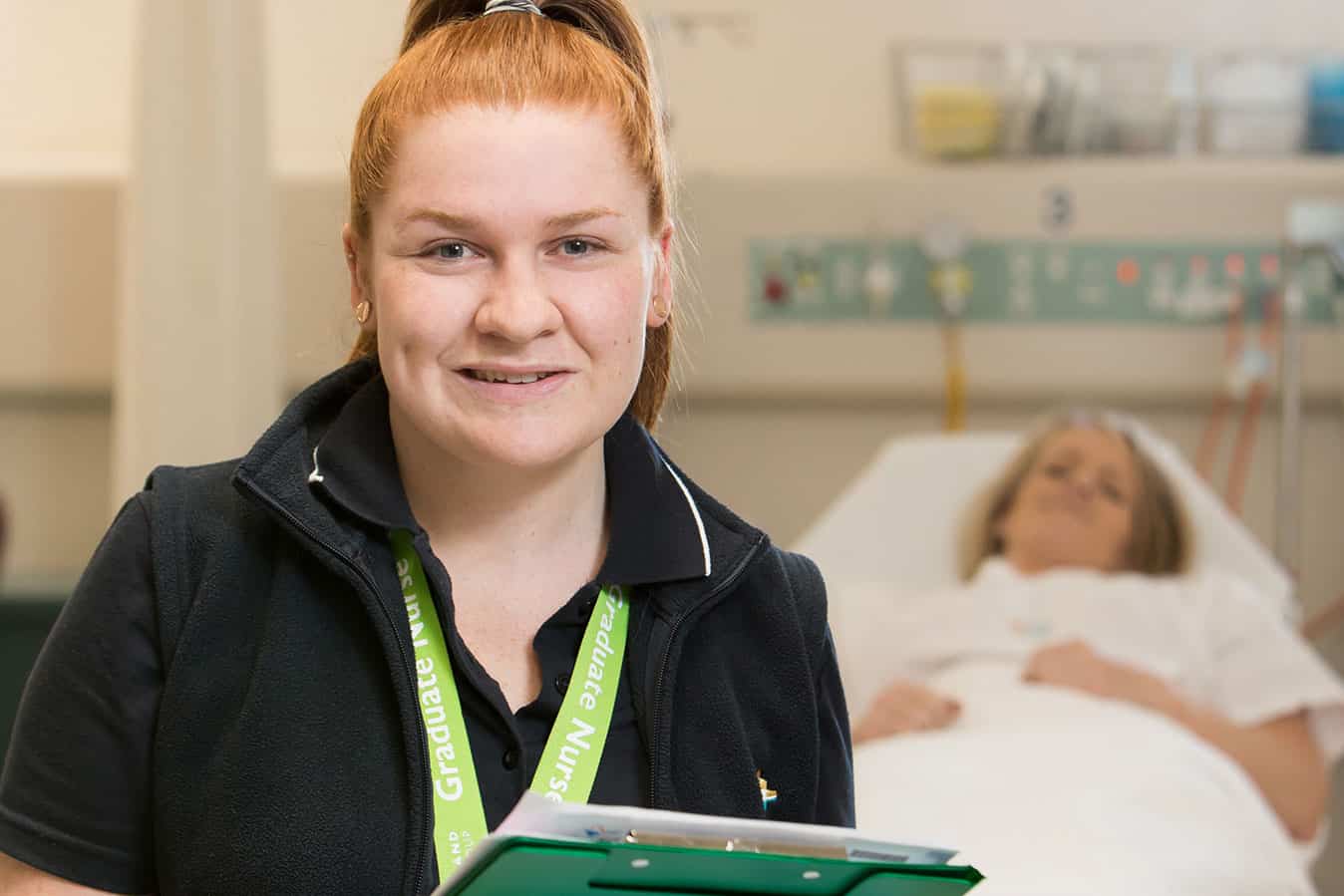There is no ‘one-size-fits-all’ approach when it comes to graduate nurse programs. So what is the best way to ensure early career nurses negotiate their graduate year with confidence?
Jessica Gadd reports it’s by implementing a well-designed graduate program and offering a supportive environment. There is no preparing for your first experience of the death of a patient, says graduate nurse Claire Azzopardi. The 23-year-old had been aware of one or two patient deaths during her student placements, but in hindsight, she realised her preceptors had sheltered her from the full experience.
As an early career nurse in a medical ward with several palliative patients, she found the experience to be different – raw and painful.
When speaking about it, there is a crackle of emotion in her voice.
“It’s really hard to push your emotions aside, to hold them back while you help the person that needs helping,” Claire says.
“At the same time, I don’t want to become desensitised to these sorts of situations.
I want to be a nurse who can still feel compassion for the patient and their families. I’d hate to get to the stage where I think ‘Oh, there goes another one, that’s the third this week’, or anything like that.’
Overall, Claire rates learning to manage the emotional fallout that comes with the death or rapid deterioration of a patient in her care as one of the hardest adjustments to nursing.

Other challenges she has faced include adjusting to the rigours of shift work and the resulting impact that it has on her body clock and life outside work. She has also had to build up her knowledge bank such as learning the vast amount of conditions and medications.
Yet she says these challenges are part and parcel of doing the job she loves- nursing, and there’s no question of ever doing another job. “It’s hard, but it’s great. I love it. I’m very happy to be learning so much.”
UniSA’s Head of Nursing and Midwifery, Adjunct Professor Carol Grech, says there is a culture in nursing that encourages people to keep their emotions bottled up and to pretend that they are stoic and unaffected by stress.
“But witnessing trauma in the workplace does affect people emotionally, and in different ways,” Professor Grech says. “That’s why it’s so important to have positive role models and opportunities to debrief about those encounters and situations.”
Claire is grateful for the supportive culture in her workplace at West Gippsland Healthcare Group. She speaks about multiple debriefing systems including frequent graduate meetings with all of the graduate nurses and the graduate coordinator. There are also adhoc, informal debriefs organised by senior nurses following highly-stressful or out-of-the-ordinary incidents, and casual conversations with colleagues who provide feedback, both positive and constructive.
“It’s these things that make the difference between me going home and being able to switch off, and going home and stewing about something all night,” Claire says.
Helping early career nurses get off to a great start
Claire says she found the two part-time clinical educators on the medical ward invaluable. “As well as checking on us each day, they had an office on the ward, so if I was really drowning I would go in and ask them to help for a moment, or I could page them to come and join me at the bedside. They were always happy to help.”
One of the clinical educators, Kerry Sibson, says controlling some elements such as how any given personality copes with stressors, and fits in with the ward culture, can mean extreme differences between the experiences of one early career nurse to the next.
“Some graduates simply fly through, others need a lot more support,’ she says.
“It’s so variable because it could come down to a single experience with a patient or colleague that goes on to affect their whole experience during that rotation, and maybe even their whole grad year.”
Ms Sibson says what can be controlled is how well these experiences are managed after they have occurred. She says the support level a graduate receives is vital – it can mean the difference between the graduate going on to have a happy and successful career or leaving the profession altogether.
“We have a good system in place here and I think we’re pretty quick to notice when a graduate is struggling,” she says. “Then we’re proactive at working with the graduate to do things like set objectives, shift plan, manage stress, and build on their critical thinking skills.”
Ms Sibson says critical thinking skills can be difficult for graduates to develop, as they are hard to teach in a traditional academic environment.
“For example, on a busy shift, some graduates might get panicked and focus on ticking the boxes of routine care, like general hygiene, rather than engaging critical thinking and prioritising care.”
To counter this, Ms Sibson checks in with graduates at the beginning of the shift and, where necessary, helps them use a shift planner to map out their day. Being positioned in the ward means she can jump in and offer hands-on support to the graduate nurses as required, and an open-door policy means graduates can seek out her advice during a shift.
However, she states every ward is different, and that some of the challenges of delivering a good graduate program is managing the skill mix. This includes ensuring there are enough skilled nurses to support graduates on any given shift, and aligning rosters so that preceptors or supernumerary staff are on at the same time as graduates.
In 2019 West Gippsland Hospital will move from four rotations during the graduate year, to three.
Ms Sibson says this is in line with the 2017 review of the Nursing and Midwifery
Graduate Transition to Practice, and part of a wider move for fewer rotations in recent years, with many hospitals now only running one 12-month or two six-month graduate placements on one or two wards, respectively.
At nearly 350 graduates, Royal Brisbane and Women’s Hospital and Metro North
Hospital and Health Service boasts one of Australia’s largest graduate nursing programs.
Executive Director of Nursing and Midwifery, Adjunct Professor Alanna Geary, explains that the Royal Brisbane and Women’s Hospital’s graduate program features a 12- 14 week ‘care to transition’ supernumerary program into the ward or unit of the graduate’s choice, and then a six-month stint as a graduate nurse in that unit or ward.
“We decided that once staff felt confident in an area, there was no reason why they could not be considered for other opportunities or positions in the organisation – but that it was often beneficial to consolidate learning and stay in one area,” Professor Geary says.
Professor Geary explains that the length of the transition to care period varies from ward to ward, and is also dependent on individual graduate needs.
“We all learn at different rates, and we all learn in different ways. So I think it’s really important that we don’t say to somebody ‘you only have two weeks of preceptor time’ – they might need six weeks. That doesn’t mean they’re not any good, it just means that they need a little bit longer to consolidate what they’ve learnt.
“We also have great educator support, so all of our educators are cognisant of a graduate who might be struggling either emotionally or just with the workload. We would put in mechanisms, and improvement plans, and some learning KPIs to actually help them. So there’s lots of support offered.”
Why good support for early entry nurses is so vital

Professional Officer at the ANMF Federal Office Julie Reeves, and a member of the
ANMF – convened National Early Career Nurse and Midwife Roundtable, underscores just how vital support is to the ongoing success of a graduate’s career. She points out that the annual attrition rate for early career nurses can be quite high, with reasons for leaving the profession ranging from struggling with shift work, to life circumstances.
“One issue often cited by some nurses leaving the profession is a lack of support,”
Ms Reeves says. “That’s why a structured graduate program that provides support and opportunities to debrief is so critical.”
Danni, currently in her graduate year at
Sir Charles Gairdner Hospital in Perth, was an early career nurse who found she needed a lot of support to begin with.
Danni had delayed applying for a graduate program due to life circumstances, including a marriage breakdown and caring for her young son, initially working part-time as a general practice nurse instead.
“Working part-time in general practice was really good for having a three-year old and coming to terms with being newly separated. But I really missed working in a hospital and I applied for the graduate program. I was still eligible, having not had a year’s experience yet and luckily I got it.”
But when Danni commenced the graduate program, she realised that the gap between finishing university, and the reduced use of clinical skills in her job as a general practice nurse, had put her on the back foot.
“Also, some of the staff were not very receptive to having questions asked of them, they would say ‘I don’t have time’, and could be quite patronising,” Danni says. “That, combined with my personal circumstances as a single mum, and the fact that I was taking a medication called Champix to try and quit smoking, meant I was under a fair bit of personal stress at the beginning of the graduate program. It all hit me at once! I remember thinking: ‘Oh my God – I can’t do any of this, what am I going to do with my life?’ I thought I would lose my position.”
Danni credits the heroic efforts of the two staff development nurses who worked on her ward for getting her through her rocky start to nursing.
“They were my biggest help, they really were amazing,” Danni says. “They pretty much carried me through those first couple of months, because I was so overwhelmed and stressed out. They gave me extra, supervised shifts for a couple of months, and set goals and objectives that I had to achieve, which really helped me to get my skills up to scratch. So the hospital was definitely supportive – and now, despite the difficult start, I feel confident, capable, and good at my job.”
‘Work-ready’ early career nurses for ‘grad-ready’ workplaces

Professor Grech says that the need for practical experience and opportunities for students to develop critical thinking led to the development of a clinician-led simulation hospital on campus at UniSA.
“It’s a safe environment, where students have an opportunity to practise their skills in an authentic setting, and where we can assess students’ clinical skills, communication, and decision-making abilities. We also model a very high standard of care, because professional behaviour and practice are not always evident in practical placements due to the complexities and cultures of real-world workplaces.”
Professor Grech says that the simulation model has worked well, with far less graduates experiencing difficulties on placements, and industry providing positive feedback. But Professor Grech says that while the aim is to create work-ready graduates, she points out that workplaces also need to be ‘graduate-ready’.
“We have to be mindful that hospitals in particular are under enormous stressors, facing the pressure of constrained budgets and therefore often reduced staffing,” Professor Grech says.
“There’s increasing casualisation and use of agency staff, which affects continuity and knowledge transfer. There are patients with complex needs, and bed pressure to get patients out as quickly as possible.
“All of these things contribute to an environment, in some sectors, which isn’t particularly graduate-ready. And unfortunately some of these workplaces are looking to graduates to perform at a high level that is unrealistic, without necessarily having great mentorship or role modelling around them.”
The ideal graduate program, Professor Grech says, puts in place a framework where graduates are strongly mentored, where they have the ability to debrief, where they can learn at their own pace, rather than a ‘one size- fits-all’ approach.
This is consistent with the graduate program best practice principles outlined in the National Early Career Nurse and Midwife Roundtable Early Career Nurse Facts and Myths Information Sheet.
“These are evidence-based suggestions that make up the recommended building blocks for a successful transition to the workplace,” Ms Reeves says. “They include things like providing a supportive environment, an appropriate skill mix, a good preceptor or supernumerary, and an environment where graduates are welcomed, appreciated and valued for what they’re bringing to the organisation.”
The Graduate Nurse and Midwife Roundtable Group was initially formed in 2014 to address a serious disconnect between the amount of nursing graduates, and the amount of graduate placements available. The result of a maelstrom of conditions, including the uncapping of university placements and a lack of funding for graduate programs, these circumstances effectively snuffed the potential careers of hundreds of future nurses. This was quite staggering given that at the time there was a predicted shortfall of more than 100,000 nurses by 2025.
“Are we ever going to get the workforce predictions right? I don’t know,” Professor
Grech says. “But I would hope as we continue to get more sophisticated in the data we are collecting, the better we will get. I think the pendulum is likely to swing back and that it will get either to a place of balance, or perhaps a slight shortfall.”
Professor Geary says that Royal Brisbane and Women’s Hospital employs graduates at 0.8 and occasionally 0.7, rather than full-time, because it allows them to offer more positions to more graduates. It’s also considered a strategy for assisting the graduate’s transition from study to shift work, and to avoid graduate burnout.
Early career nurse pathways
Although most early career nurses are keen to cut their teeth in acute facilities, there is an emerging trend for graduates to undertake programs in non-traditional settings.
“It’s becoming more common for graduates to go into facilities other than hospitals as part of their graduate program,”
Ms Reeves says. “For example, a graduate might do part of their graduate year in an acute facility, and the other part in primary health, such as a general practice. This gives early career nurses a chance to expand into growth areas that we know are significantly increasing.
“Aged care, for example, is quite complex because of the frailty factors and because there are significant comorbidities. If you’re working in acute care you’re often working with older people anyway. So there’s a lot of conversation about how aged care is a good skill for developing your assessment and time management skills. Unfortunately it’s viewed by some as unglamorous, when the reality is that acuity in aged care facilities is on the rise.”
UniSA’s Professor Grech believes that in the future nurses will increasingly work across sectors, from hospital to home. “We know that as more people are living longer, with complex needs and chronic conditions we need to look at nursing roles that are not essentially based within acute services. So we’re working closely with a number of graduate programs in areas like residential aged care, primary healthcare services, correctional services and mental health.”
Professor Geary says that the advantage of Royal Brisbane and Women’s Hospital being a part of Australia’s largest healthcare service, Metro North Health Service, which employs 7,500 nurses and midwives across a number of facilities, is that graduates can pursue many different career pathways without needing to change employers, which can be beneficial for career development.
“In Metro North Hospital and Health Service we employ graduates in all settings – sub acute, aged care, acute care, community settings,’ Professor Geary says.
“It’s interesting, because at the time of their application graduates think that they want to work in the big tertiary hospitals, but once they have an opportunity in other services we’ve noticed they actually love the smaller hospitals and the community service models. So we’re very blessed in that we have a diverse hospital and healthcare system. It means we can offer our graduates just about any experience they want.”
Gaining experience is what the graduate year is all about. Claire Azzopardi advises other graduates starting out to try to do as much as they possibly can. “I used to shy away from doing the things I perceived as difficult, but now I’ve learned that it’s better to practice while no one expects too much of you and help is still on hand.”








